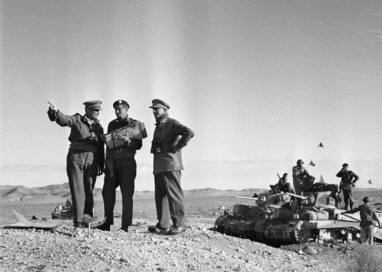
Harry’s first assignment on returning to North Africa was in one of several thin-skinned, light armoured units known as Jock Columns that with artillery support patrolled deep into the Western Desert to harass Italian troops. One of Harry’s personal responsibilities was to destroy abandoned enemy tanks before they could be recovered by their maintenance crews, a role often accomplished under enemy fire.
After the ebb and flow of engagements that won and subsequently lost ground in the shifting battles in the desert, the New Zealand Division under Major-General Bernard Freyberg, VC withdrew to Syria to regroup, train, and reconnoiter the open country. Syria was a potential alternative route for German troops to capture the oil fields of the Middle East. In 1942 Freyberg returned the division to Egypt to respond to the increasingly successful offensives of German General Erwin Rommel, the ‛Desert Fox’.
Now embarking on what would be
a lifetime experience, Harry became part of the DivCav troop assigned to
protect General Freyberg. The 2nd New Zealand Division, under Freyberg’s
command, was part of British General Bernard Montgomery's 8th Army. The
powerful El Alamein offensive in October 1942 began a broad and successful
advance westwards across the desert. Victory was declared in Tunisia in May 1943. Harry’s Stuart tank was one of four
vehicles that accompanied General Freyberg throughout the
desert campaign.
Harry was as close to ‘the General’ (as Freyberg was known) as any of his staff. They knew each other personally, and on one occasion in the field, Harry and a fellow DivCav soldier slept either side of Freyberg under two parked tanks. (Harry remembers that Freyberg, always alert, woke them around 3:00 a.m. to check the time; Harry was not amused.)
Following North Africa, Harry fought in the tough winter campaign in Italy, eventually returning to New Zealand as new reinforcements steadily replaced men who had fought hard, virtually without a day's rest or respite, since April 1941 in Greece.
Harry returned to New Zealand, married his wife Madge in 1947, and enjoyed a happy, productive life in Hastings. For fifty years, he was active in Heritage (which helped the children of lost soldiers) and served as President of the Divisional Cavalry Association. He was an active member of the Royal New Zealand Returned Services Association (known as the RSA), which is New Zealand’s veterans’ organization.
We are proud and honoured that Harry Spencer agreed to be our founding Patron and help us make this online resource a reality for all DivCav families and friends.
We will remember him with great affection and respect.
Thank you, ‘Uncle Harry’.
– Ian Latham
Founder
DivCav

“It was a great honour for a country boy to be able to mix with some of the world’s great leaders, and be
treated with respect”
Harry Spencer
February, 2012
General Freyberg (left) surveys the advance on Tripoli in May 1943. Harry's DivCav Protective Troop is behind. National Library of NZ.
![]()